#Lamarck's Giraffe
Explore tagged Tumblr posts
Text
everything can be an orv reference if you put your mind to it
#my ramblings#me scrolling through bio flashcards: woah… lamarck’s giraffe…#(has an exam on evolution in over an hour)
10 notes
·
View notes
Text
so funny to me that we started naming species as SOON as we THOUGHT we'd figured out evolution. really couldve benefitted from hindsight in the field of biology.
#.din#.txt#bring darwin to the future and show him future evolution.#bring lamarck. show him how we all mock his giraffes.
3 notes
·
View notes
Text
Top scientists at MIT have announced that they've located a 500-cubic-meter region of space where Lamarckism is true. "Now to be clear, Darwinian Evolution is true and correct everywhere else, but in here? All Lamarck, all the time," they clarified. "We're not telling anyone where, because you'd all come and do stuff even worse than what we've been doing, like with athletes and soldiers and shit. Whereas we've mostly stuck to Giraffes. Boy, have we stuck to some fucking Giraffes. You would not believe the necks that we've managed so far, I mean cut these thing's heads off at the shoulder and you're most of the way to a Titanoboa. Anyway."
2K notes
·
View notes
Note
For the Reverse Unpopular Opinion meme, Lamarckism!
(This is an excellent ask.)
Lamarck got done a bit dirty by the textbooks, as one so often is. He's billed as the guy who articulated an evolutionary theory of inherited characteristics, inevitably set up as an opponent made of straw for Darwin to knock down. The example I recall my own teachers using in grade school was the idea that a giraffe would strain to reach the highest branches of a tree, and as a result, its offspring would be born with slightly longer necks. Ha-ha-ha, isn't-that-silly, isn't natural selection so much more sensible?
But the thing is, this wasn't his idea, not even close. People have been running with ideas like that since antiquity at least. What Lamarck did was to systematize that claim, in the context of a wider and much more interesting theory.
Lamarck was born in to an era where natural philosophy was slowly giving way to Baconian science in the modern sense- that strange, eighteenth century, the one caught in an uneasy tension between Newton the alchemist and Darwin the naturalist. This is the century of Ben Franklin and his key and his kite, and the awed discovery that this "electricity" business was somehow involved in living organisms- the discovery that paved the way for Shelley's Frankenstein. This was the era when alchemy was fighting its last desperate battles with chemistry, when the division between 'organic' and 'inorganic' chemistry was fundamental- the first synthesis of organic molecules in the laboratory wouldn't occur until 1828, the year before Lamarck's death. We do not have atoms, not yet. Mendel and genetics are still more than a century away; we won't even have cells for another half-century or more.
Lamarck stepped in to that strange moment. I don't think he was a bold revolutionary, really, or had much interest in being one. He was profoundly interested in the structure and relationships between species, and when we're not using him as a punching bag in grade schools, some people manage to remember that he was a banging good taxonomist, and made real progress in the classification of invertebrates. He started life believing in the total immutability of species, but later was convinced that evolution really was occurring- not because somebody taught him in the classroom, or because it was the accepted wisdom of the time, but through deep, continued exposure to nature itself. He was convinced by the evidence of his senses.
(Mostly snails.)
His problem was complexity. When he'd been working as a botanist, he had this neat little idea to order organisms by complexity, starting with the grubbiest, saddest little seaweed or fern, up through lovely flowering plants. This was not an evolutionary theory, just an organizing structure; essentially, just a sort of museum display. But when he was asked to do the same thing with invertebrates, he realized rather quickly that this task had problems. A linear sorting from simple to complex seemed embarrassingly artificial, because it elided too many different kinds of complexity, and ignored obvious similarities and shared characteristics.
When he went back to the drawing board, he found better organizing schema; you'd recognize them today. There were hierarchies, nested identities. Simple forms with only basic, shared anatomical patterns, each functioning as a sort of superset implying more complex groups within it, defined additively by the addition of new organs or structures in the body. He'd made a taxonomic tree.
Even more shockingly, he realized something deep and true in what he was looking at: this wasn't just an abstract mapping of invertebrates to a conceptual diagram of their structures. This was a map in time. Complexities in invertebrates- in all organisms!- must have been accumulating in simpler forms, such that the most complicated organisms were also the youngest.
This is the essential revolution of Lamarckian evolution, not the inherited characteristics thing. His theory, in its full accounting, is actually quite elaborate. Summarized slightly less badly than it is in your grade school classroom (though still pretty badly, I'm by no means an expert on this stuff), it looks something like this:
As we all know, animals and plants are sometimes generated ex nihilo in different places, like maggots spontaneously appearing in middens. However, the spontaneous generation of life is much weaker than we have supposed; it can only result in the most basic, simple organisms (e.g. polyps). All the dizzying complexity we see in the world around us must have happened iteratively, in a sequence over time that operated on inheritance between one organism and its descendants.
As we all know, living things are dynamic in relation to inorganic matter, and this vital power includes an occasional tendency to gain in complexity. However, this tendency is not a spiritual or supernatural effect; it's a function of natural, material processes working over time. Probably this has something to do with fluids such as 'heat' and 'electricity' which are known to concentrate in living tissues. When features appear spontaneously in an organism, that should be understood as an intrinsic propensity of the organism itself, rather than being caused by the environment or by a divine entity. There is a specific, definite, and historically contingent pattern in which new features can appear in existing organisms.
As we all know, using different tissue groups more causes them to be expressed more in your descendants, and disuse weakens them in the same way. However, this is not a major feature in the development of new organic complexity, since it could only move 'laterally' on the complexity ladder and will never create new organs or tissue groups. At most, you might see lineages move from ape-like to human-like or vice versa, or between different types of birds or something; it's an adaptive tendency that helps organisms thrive in different environments. In species will less sophisticated neural systems, this will be even less flexible, because they can't supplement it with willpower the way that complex vertebrates can.
Lamarck isn't messing around here; this is a real, genuinely interesting model of the world. And what I think I'm prepared to argue here is that Lamarck's biggest errors aren't his. He has his own blind spots and mistakes, certainly. The focus on complexity is... fraught, at a minimum. But again and again, what really bites him in the ass is just his failure to break with his inherited assumptions enough. The parts of this that are actually Lamarckian, that is, are the ideas of Lamarck, are very clearly groping towards a recognizable kind of proto-evolutionary theory.
What makes Lamarck a punching bag in grade-school classes today is the same thing that made it interesting; it's that it was the best and most scientific explanation of biological complexity available at the time. It was the theory to beat, the one that had edged out all the other competitors and emerged as the most useful framework of the era. And precisely none of that complexity makes it in to our textbooks; they use "Lamarckianism" to refer to arguments made by freaking Aristotle, and which Lamarck himself accepted but de-emphasized as subordinate processes. What's even worse, Darwin didn't reject this mechanism either. Darwin was totally on board with the idea as a possible adaptive tendency; he just didn't particularly need it for his theory.
Lamarck had nothing. Not genetics, not chromosomes, not cells, not atomic theory. Geology was a hot new thing! Heat was a liquid! What Lamarck had was snails. And on the basis of snails, Lamarck deduced a profound theory of complexity emerging over time, of the biosphere as a(n al)chemical process rather than a divine pageant, of gradual adaptation punctuated by rapid innovation. That's incredible.
There's a lot of falsehood in the Lamarckian theory of evolution, and it never managed to entirely throw off the sloppy magical thinking of what came before. But his achievement was to approach biology and taxonomy with a profound scientific curiosity, and to improve and clarify our thinking about those subjects so dramatically that a theory of biology could finally, triumphantly, be proven wrong. Lamarck is falsifiable. That is a victory of the highest order.
2K notes
·
View notes
Note
anonymous said what they said...
but if Abby Morningstar's height needed to stretch and reach higher leaves... change acquired over the lifespan is inherited, dontcha know
Abby in the RP height be like 🦒
lol abby morningstar is the same height that abigail [last name redacted] is, 5'11"
#(this is because i saw a giraffe)#(and lamarck's classic example of acquired change being inherited and being the mechanism of transmutation - early word for evolution -#being giraffes)#(lamarck was wrong change acquired during the lifespan is not how evolutionary change happens)#(except phylogenetics but... that's a whole debate. it's also not what he meant)
5 notes
·
View notes
Text

obviously couldn't help but join the 'how do you draw yoohankim' trend ^_^
when I had just finished orv (as a novel reader) I initially did YJH with a middle part, my main hc influences were two other tumblr artists's HCs. I did end up changing his hair to be a little closer to official art later on, just with the curls <3
since I'm into AA and ORV at the same time, HSY was designed to avoid overlap with my Franziska design... because of Course I'd get invested in two medium-hair-length, dangerous-looking, left-undereye-mole blorbos at the same time. Thus HSY's small nose, weirdly specific hair styling, and of course the centered mole.
For KDJ's big scars, I like to reflect some of his Lamarck's Giraffe story fragment nonsense (the swordmaster's right arm, gold dragon's heart)
#orv#omniscient reader's viewpoint#omniscent reader#yoohankim#yhk#yoo joonghyuk#yjh#kim dokja#kdj#han sooyoung#hsy#jan 2024#2024
261 notes
·
View notes
Text

this one's an interesting skill. according to a quick google search, lamarck was a naturalist in the early 1800s who proposed an early, but flawed, model of evolution. he suggested that organisms who changed their behavior would induce heritable physical changes as a result of that behavior. the example given was a giraffe reaching its neck upward to eat leaves. as the giraffe used its neck more, its neck would become longer, and the longer neck would be passed down to offspring. (obviously, this is a flawed idea of how evolution works, but he was on the right track.)
skills are often small "stories" in orv. it's quite interesting, therefore, that an outdated theory of evolution would be a skill here. I suppose the theory could be considered a story on its own. additionally, it is INTERESTING that the "evolution" the skill creates is one where someone can absorb fragments of someone else's stories. rather than "an organ developed by an ancestor's behavior being passed down to offspring" the skill reflects "a story (body part) developed by someone else's actions being absorbed into the story (body) of someone who consumes it." same transmission of organs through effort, but with an entirely different relationship between the person who developed the story and the person who inherits it.
101 notes
·
View notes
Text
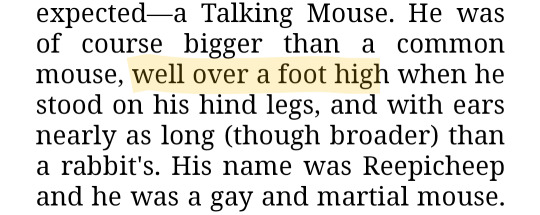
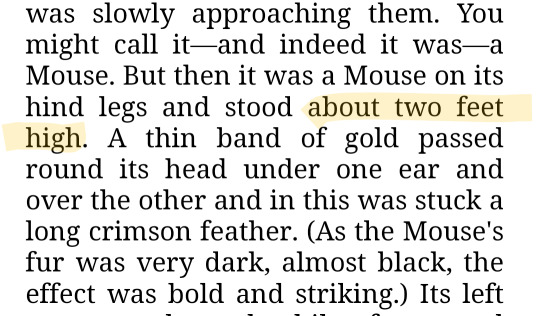
So... since clearly Jack never makes continuity errors, tell me your theory on what happened to Reepicheep between PC and VDT.
#polls#been trying to think of a funny post i could make on this subject for ages and i finally cracked it#just so we're clear: Reepicheep does NOT slouch and anyone who picks that option is WRONG#narnia#pontifications and creations#edit: i thought it was obvious when i made this that I was making fun of Jack's tendency towards poor continuity and attempting to be funny#not failing to consider that 2>1#i realize that people are pointing that out in good faith but it is. really irking me#like i know that's the most likely answer but doesn't it kinda seem like jack maybe didn't check his notes?#if i could i would add in an answer that's like 'well actually two feet is well over a foot (boring answer)'
180 notes
·
View notes
Note
do you have further thoughts on darwin as a lamarckian?
what's defined as 'Darwinian' versus 'Lamarckian' in the Anglo and Francophone literature has very little to do with anything Darwin or Lamarck themselves wrote or thought. Lamarck's name and evolutionary intellectual milieu were already associated with various strains of republican, materialist, and atheist sentiment throughout the first half of the nineteenth century, and under the Third Republic, many French liberals took up an overtly nationalist 'neo-Lamarckian' party line for this very reason, seeking to contrast an invented French priority claim to the evolutionary treatises Darwin published in 1859 and 1871. additionally, the legacies of Kammerer and Lysenko have really altered public perception of Lamarck and 'Lamarckian' mechanisms of heredity. meanwhile Darwin took great care to claim he was NOT engaging in "Lamarck nonsense" when he finally published On the Origin of Species, and generally his proponents and popularisers, especially in the London set, also quite liked this narrative. then in the 1960s with the birth of the 'Darwin Industry' in historical scholarship, the then-dominant theory of genetics combined with the English nationalist interest in Darwiniana made it popular and even profitable to claim a sharp distinction between 'Darwinism' (non-teleological, mechanistic, natural selection) versus 'Lamarckism' (purposive, inheritance of acquired characters). interestingly, these days there is a vogue for claiming that research into epigenetics is 'redeeming' Lamarck over Darwin, though I wouldn't put much stock into it; it's still based on a poor reading of both men's actual ideas and anyway, analogous claims were also fashionable during the early 20th century, particularly among certain American biologists but even in the English set as well.
anyway since arguably the main point of contention here concerns the 'inheritance of acquired characters': Darwin also believed in this, as did virtually anyone advocating for evolutionary ideas from the mid-18th century onward. it was not controversial and is still not controversial, except in its cartoonishly extreme forms like Cuvier's line (propagated by Lyell and then to Darwin) about Lamarck thinking that a giraffe could just magically wish itself to have a longer neck and then pass that along to its offspring. this is not what he thought (he conceived of biological change on a massive, multigenerational timescale and considered it mediated by habitual actions).
more to the point it decontextualises evolutionary theory from its home base in discourses on animal and plant breeding, which matters because the idea that humans could alter the forms, behaviours, and temperaments of living beings was from the get-go also applied to ideas about the alteration of the human species. these proto-eugenic Enlightenment ideas make clear the political stakes of the nineteenth century debates over evolution, which gradually coalesced into what we now recognise as the overtly eugenic positions of the late nineteenth and twentieth centuries (where French positions tended to lean more toward natalist, associationist, 'positive' eugenics and English positions in a more Malthusian, 'negative' direction). so yes Lamarck was a 'Darwinist' and Darwin was a 'Lamarckian' but what's more critical here imo is that this simple nationalist narrative of precursors and priority claims greatly distorts our ideas of what it even meant to be an 'evolutionist' (transformiste) and how these biological ideas were ideological, eugenic, and racial from day 1. as Emma Spary points out, we would really be better off understanding 19th century 'evolution' as situated in a broader matrix of concerns about how to engineer a 'better' society, and how the ideal citizen and indeed human was defined and justified in biological terms.
26 notes
·
View notes
Text
Today's random SCP of the day is SCP-1169: Lamarck's Giraffe
2 notes
·
View notes
Text
For those not on the Webnovel scene; it's not quite a scam, but it is unbelievably shady and exploitative. Webnovel is an Official™️ Wattpad competitor run by QiDian. WuxiaWorld, a site that boasts massive archives of Chinese fantasy novels, wrote a contract to let them translate novels posted on QiDian. Note that these translators had the rights to these works. Then as soon as QiDian created Webnovel, it broke the contract and started poaching talent from WuxiaWorld (so they could rip their work off WW and have it run on Webnovel instead). Most egregiously, they would steal translations wholesale. Like, actual theft that WW had to fight them for. This was a huge deal in 2018.
Popular webnovel Omniscient Reader's Viewpoint (Omniscient Reader) is a title licensed on Webnovel you'd probably recognize; prolific Rainbow Turtle (who also did TLs on WuxiaWorld) was using machine translation and skilled editing to power through the novel, and then Webnovel hired RT on to bring on her fan-translation and keep going on THEIR platform, even though Rainbow Turtle is, again, a machine translator. There are no editors after transferring, so blatant errors were left in. Items to do with Korean history were distorted beyond readability, which is okay when you're posting chapters to your blog trying to catch up to like 100 chapters with daily updates but absurd on an official platform that SHOULD have editors to do that work for her. And very importantly, on Webnovel, the translator is not allowed to edit the chapters after posting.
They later got a new translator who completely changed terminology, creating a bizarre mix of completely different standardizations (the names), actual corrections (lamarck's giraffe), and just straight up changing translations for no reason (unbreakable faith). Because the translator isn't allowed to edit after posting, there was an extended frazzled back-and-forth where it was implicitly understood that because Webnovel is an IP farm/content mill, the interaction is isolated between the readers and the translator trying to figure out what to do, and the translator simply did not have any resources or guidance from QiDian&Webnovel to help with this. The website's only goal was to accrue readers.
So as you can probably guess fans of asian webnovels want to kill and eat this website. Not surprised QiDian's trying to pad out the fic aspect to overpower Wattpad. All these corporate sons of bitches care about is unchecked growth.
I got this comment on a story from my Other AO3 Account this morning.

(Info redacted because I prefer keeping these accounts separate but no one follows me on the side blog I have for that account.)
The story was posted almost a year ago and is relatively “popular” by my average statistics even though it has tropes and themes that are big turnoffs for a lot of people (hence separate accounts). This popularity is undoubtedly because it’s a Marvel Loki story and that fandom is massive.
So there is obviously an algorithm or a bot scrubbing ao3 statistics and leaving this comment on fics that meet a certain metric with the main character of the fic inserted into the comment.
I had a little time to kill this morning so I decided to investigate further. And y’all this is so predatory. Come on this journey with me. It made me mad. It may make you mad.
First, if you go to Webnovel’s website, you HAVE to choose between male lead or female lead stories before you can go any further. WTF?
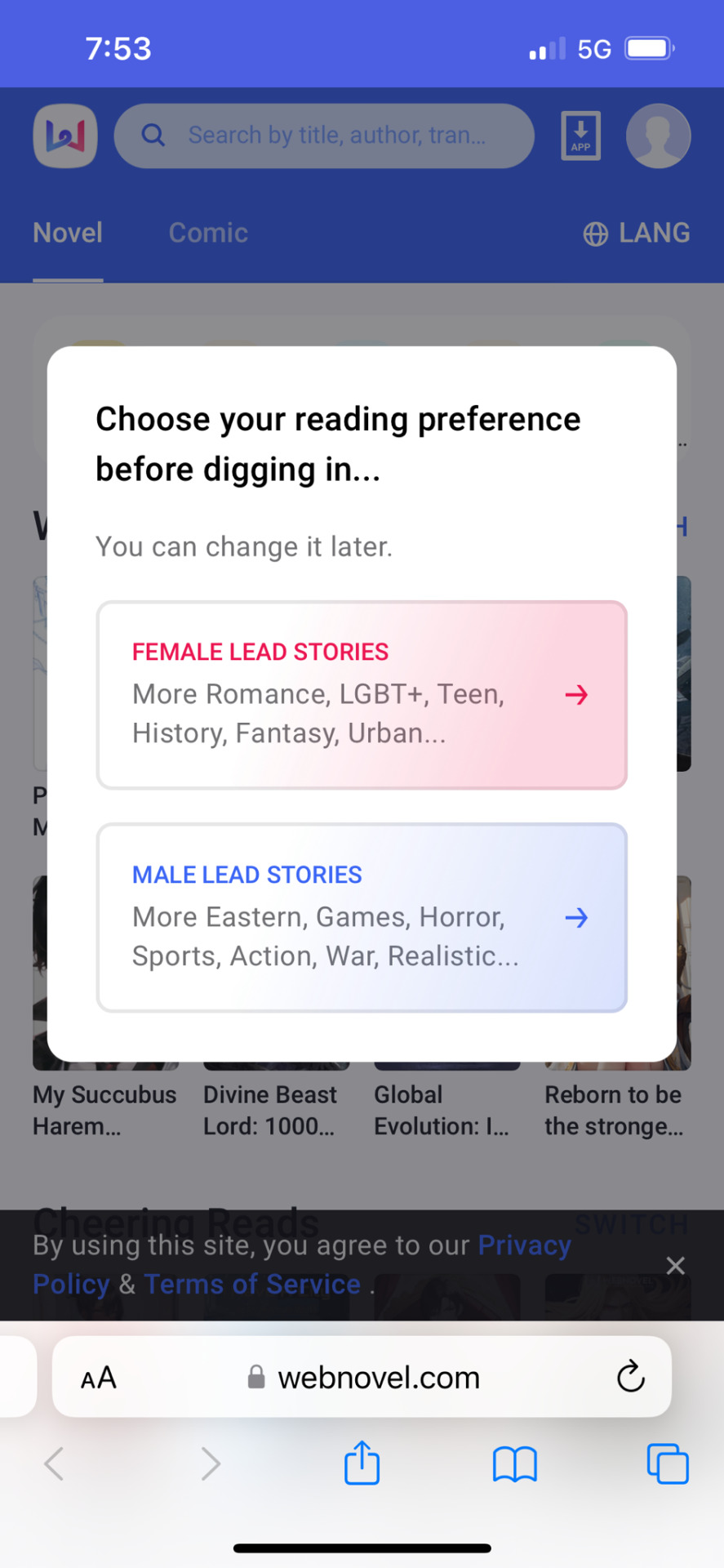
And that’s weird, but this gets so much worse. This is basically a pay-to-read site that has different subscription models. Which… okay BUT! The authors don’t get paid! Look at that comment again. They’re promising a supportive and nurturing community, but zero monetary compensation. It’s basically, “post your stuff here so we can get paid and you can get… nice vibes?” I mean look at this Orwellian writing:

Using the phrase “pay-to-read model” in the same sentence as “qualitative changes in lifestyles for authors” deliberately makes you think that you can get paid and maybe even make a living on this website. But that’s not actually what it says and authors will not receive one red cent.
Oh but wait, the worst is still to come. In case this breaks containment (which I kind of hope it does) this is where I mention that I’m a lawyer in the US.
I don’t do intellectual property or copyright law but I do read and write contracts for a living. So I went to look at their terms of service. It was fun!
Highlights the first, in which Webnovel gets a license to do basically whatever they want with content you post on their site. This is how they get to be paid for people reading authors’ writing without paying them anything.
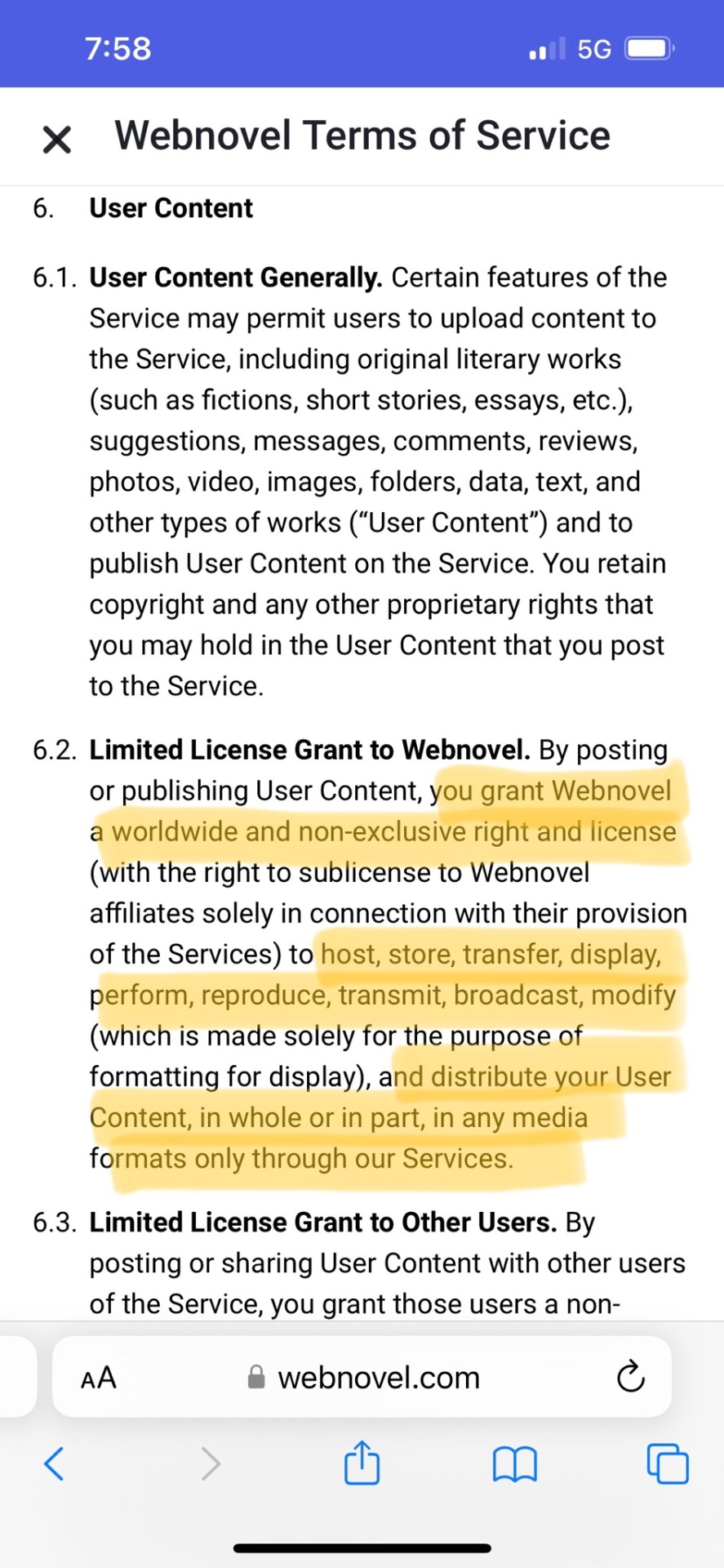
Highlights the second, in which Webnovel takes no responsibility for illegally profiting off of fan fic. This all says that the writer is 100% responsible for everything the writer posts (even though only Webnovel is making money from it).
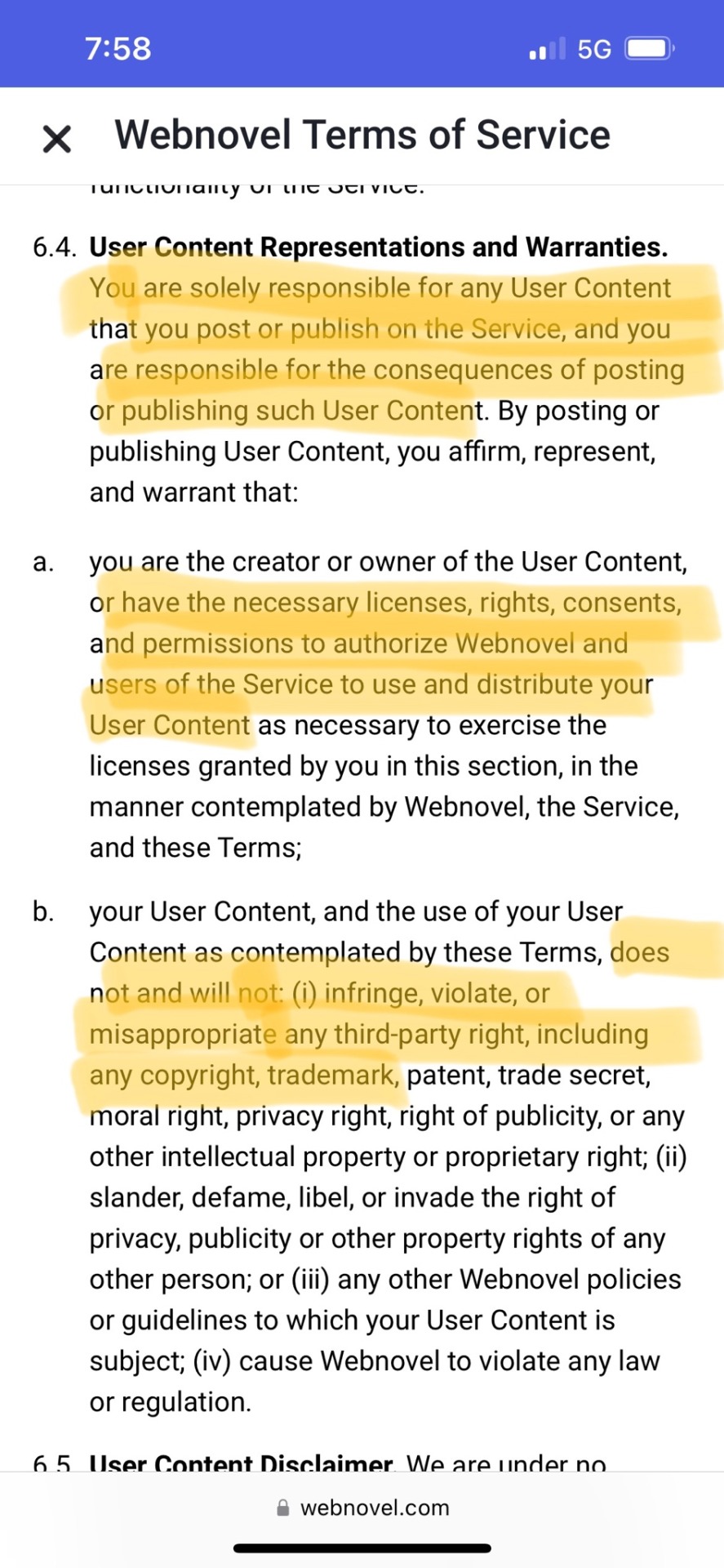
Highlights the third which say that by posting, the author is representing that they have the legal right to use and to let Webnovel use the content according to these terms. So if a writer posts fan fiction and Webnovel makes money from people reading the fan fiction, and the House of the Mouse catches wise, these sections say that that’s ALL on the writer.
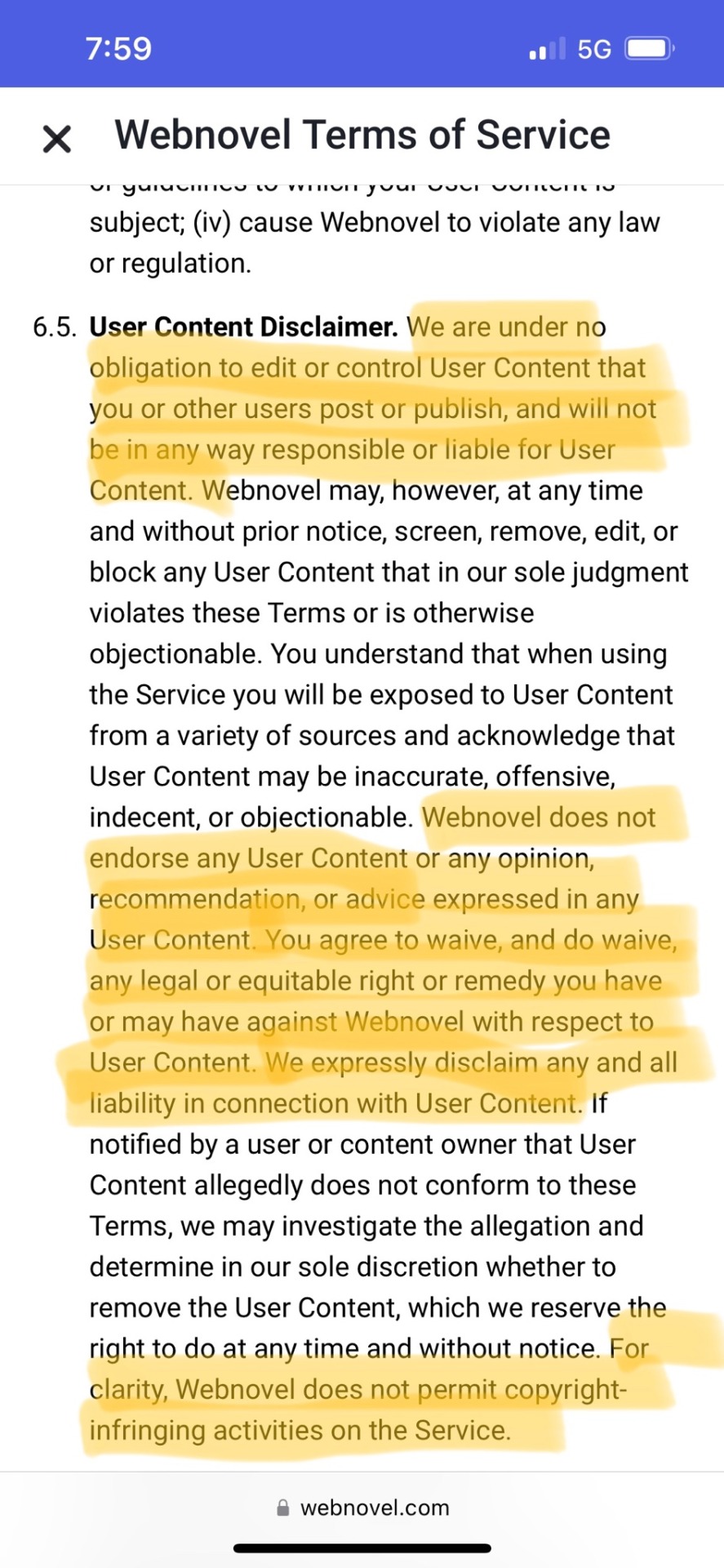
So that’s a little skeevy to start off with but the thing that is seriously shitty and made me make this post was that these assholes are coming to ao3. They are actively recruiting people in comments on their fan fiction. And they are saying they are big fans of the character you’re writing about and that they share your interests.

They are recruiting fan fiction writers and giving every impression that you can make money from posting fan fiction on their site and hiding the fact that you absolutely cannot but they can make money off of you while you try, deep in their terms of service which no one but a lawyer who writes fan fic and has some time to kill will read.
I see posts on here regularly from people who don’t understand how this stuff works, don’t understand that they (and others) can not legally make a financial profit from fan fiction. And there are tons of people who will not take the time to dig into the details.
Don’t deal with these bastards. Fuck Webnovel.
53K notes
·
View notes
Text
Non Darwinian
cc:
Non-Darwinian evolution refers to evolutionary theories and mechanisms that differ from or extend beyond the traditional Darwinian framework of evolution through natural selection. While Darwinian evolution emphasizes natural selection as the primary driver of adaptive evolution, non-Darwinian approaches highlight other factors or processes that contribute to evolutionary change. Here are some key concepts within non-Darwinian evolution:
1. Lamarckism
Concept: The theory proposed by Jean-Baptiste Lamarck that organisms can pass on traits acquired during their lifetime to their offspring.
Example: A giraffe stretching its neck to reach higher leaves and then passing on a longer neck to its offspring.
2. Neutral Theory
Concept: Proposed by Motoo Kimura, this theory suggests that much of the genetic variation observed within populations is due to genetic drift rather than natural selection. According to this theory, most mutations are neutral and do not affect an organism’s fitness.
Example: Variation in DNA sequences that do not impact an organism's ability to survive or reproduce.
3. Epigenetics
Concept: Epigenetics involves changes in gene expression that do not alter the underlying DNA sequence but can be passed to subsequent generations. These changes are often influenced by environmental factors.
Example: Methylation of DNA or modification of histone proteins affecting gene expression without altering the genetic code itself.
4. Punctuated Equilibrium
Concept: Proposed by Stephen Jay Gould and Niles Eldredge, this theory posits that species remain relatively stable for long periods, with significant evolutionary changes occurring rapidly in short bursts, often associated with speciation events.
Example: The fossil record showing long periods of stasis interrupted by sudden changes.
5. Symbiogenesis
Concept: Proposed by Lynn Margulis, symbiogenesis suggests that new species arise from the symbiotic relationships between different organisms. This process involves the merging of genetic material from different species.
Example: The origin of mitochondria and chloroplasts in eukaryotic cells, which are thought to have originated from symbiotic relationships between early eukaryotes and bacteria.
6. Extended Evolutionary Synthesis (EES)
Concept: The EES builds on Darwinian evolution by integrating additional processes such as epigenetics, gene-environment interactions, and developmental constraints into the understanding of evolutionary mechanisms.
Example: How developmental biology influences evolutionary changes, incorporating factors like gene regulatory networks and evolutionary developmental biology (evo-devo).
Summary
Non-Darwinian evolution encompasses a variety of theories and mechanisms that contribute to the understanding of how evolution operates beyond the traditional Darwinian model of natural selection. These perspectives include genetic drift, epigenetic changes, symbiosis, and others, offering a more nuanced view of evolutionary processes.
0 notes
Text
the survivorship bias airplane. lamarck's giraffes. does anyone have further examples of these sorts of nouns.
2 notes
·
View notes
Text
A Wargamer's Diary | 100 Mistakes that Changed History
Buongiorno! Guten Morgen! Good morning!
I'm starting to write the so-called "A Wargamer's Diary" sharing my take on many things closest to my heart - history and wargaming. While I do this, I'm working on a script for the new episode of my own podcast, "Kenelogue: A Monologue," it's been more than a year since the last time I uploaded my pilot episode.
The first entry I want to tackle about is a book written by Bill Fawcett, "100 Mistakes that Changed the World." The book is currently with my best friend named Danica, because I let her borrow the book for her to read, as we always talk about history, law, and politics. Nica just finished taking her bar exams, and waiting for the results. I prayed that she will pass the bar exam.

I bought the book five years ago, and I have been reading it many times. Now, I let Nica borrow the book, as part of her "self-love" after her recent break-up. In the book, you can read the battles and economic crisis from the time of the Romans to today's time. The author focused on some lesser known mistakes, some that we did not know about, but there are lot more about the Second World War.

And one of my favorite blunders was the chapter "Miracle by Mistake," the Battle of Dunkirk in 1940. Another one was the German invasion of the Soviet Union, and the infamous Lamarckism where the meme "Giraffes are heartless creatures" from Hearts of Iron IV comes from. The Second World War has been my favorite topic in history subject, and authors and historians never ceases to amaze me on many "blunders" related to that war.
For me, it is a really good book that I read, especially when I am interested in world wars. For a wargamer who is interested in battles, I think this is the best book you can read especially when you are in a long line, or when you are in a long trip.
Yet I would agree with George Santayana saying, "Those who cannot learn from history are doomed to repeat it." But what chills down my spine is what Santayana said, "History is a pack of lies about events that never happened told by people who aren't there."
@kenelogue
0 notes
Text

Me as lamarck’s giraffe training hard so that my children will be born with innate calculus skills
0 notes
Text
¡El Lamarckismo!
Alguna vez me preguntaron cuál era mi animal favorito y no supe qué responder. No es que nunca hubiera tenido algún favorito, el detalle es que hasta ese momento no lo había elegido yo. Solo me había dejado llevar por algunas ideas de moda o por la cercanía de las mascotas domésticas. En esta ocasión las respuestas clásicas no me satisficieron, es decir, no es que tengan algo de malo los adorables gatitos y perritos, pero existe el sesgo de que son lo que mejor conocemos. En fin, la pregunta siguió rondando por mi cabeza algún tiempo.
Una ocasión al ver un folder que había comprado y usado tiempo antes con una caricatura de jirafa, concienticé mi gusto por este animal. Si bien, me gustaba la manera cómo contrastaban sus colores, había algo más en ellas que me agradaba. Me parece que las jirafas son simpáticas, la manera en la que mastican hojas, cómo toman agua, su grandeza y estilizada delgadez. Sin embargo, aún me faltaba identificar si en alguna parte de mi historia me había enganchado con este mamífero.
Una vez más, la ciencia me respondió. ¿Recuerdas el Lamarckismo? Nos lo enseñaban en la secundaria como una teoría fallida sobre la evolución de las especies. Su creador, Jean-Baptiste Lamarck, sugería que las jirafas tenían el cuello largo debido a la necesidad de sus antecesores de alimentarse de hojas de árboles altos. La teoría acabó por recharzarse, si a mi me preguntan, más que por errónea, por imprecisa. El chiste es que desde que adquirí este conocimiento, también lo hizo mi curiosidad por la ciencia. El resto es historia.
Ayer terminé un rompecabezas que me llevó mucho tiempo armar. Quedaron listas mamá jirafa y su cría. La imagen es tierna, y me quise unir. Gracias por el cariño.

0 notes